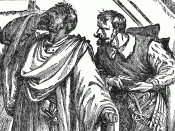Shakespearean tragedies rarely contain blameless characters. The characters whose lives get turned upside down usually either deserve it, or they directly contributed to their downfall by holding onto some flaw or vice. This is always true for his tragic heroes, but what about his minor characters? They usually suffer just as much as the main characters. They usually exhibit character flaws. The difference is that they are rarely responsible for their own downfall; their circumstances come about from things outside of their control. Othello's Michael Cassio is an example of such a character. He is shown as a good man with minor flaws whose suffering is orchestrated by people and events that he has no say over.
Cassio is a character with many strengths and very minor faults. He is presented as a man who is loyal, trustworthy, respectful and good natured. His loyalty and love for Othello are illustrated many times over.
In the beginning of Act II, he is shown as fraught with worry for Othello's safety. A gentleman remarks "he speaks of comfort touching the Turkish loss, yet he looks sadly and prays the Moor be safe." (II, 1, 30-32) When he is demoted for fighting, he does not mourn his state for selfish reasons like the loss of his prestige, but because it has tarnished his reputation and has caused a rift between himself and Othello.
In contrast, his flaws are minor indeed. It can only be said of him that he is flirtatious, sleeps with a prostitute and cannot hold his drink. What is telling, is that these "flaws" are lesser versions of real tragic flaws. It isn't said that he sleeps with other men's wives, he is simply familiar and friendly with them. He sleeps with a prostitute, Bianca, yes, but...
![From the Library of Congress: TITLE: Thos. W. Keene. Othello CALL NUMBER: POS - TH - 1884 .O7, no. 1 (C size) [P&P] REPRODUCTION NUMBER: LC-USZC6-58 (color film copy transparency) RIGHTS INFORMATION: No known restrictions on publication. MEDIUM: 1 print (](https://s.writework.com/uploads/9/94760/library-congress-title-thos-w-keene-othello-call-number-pos-thumb.jpg)

